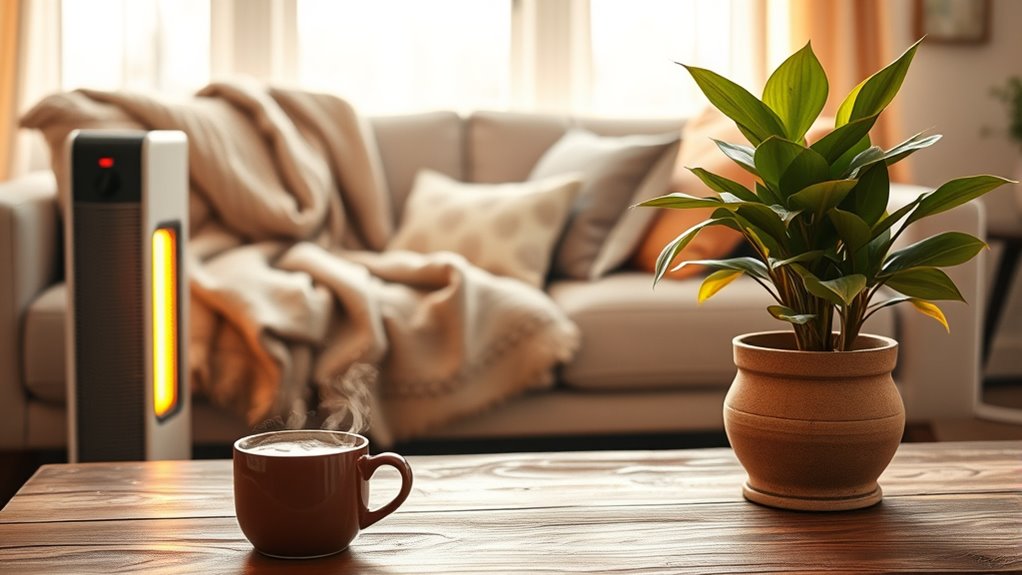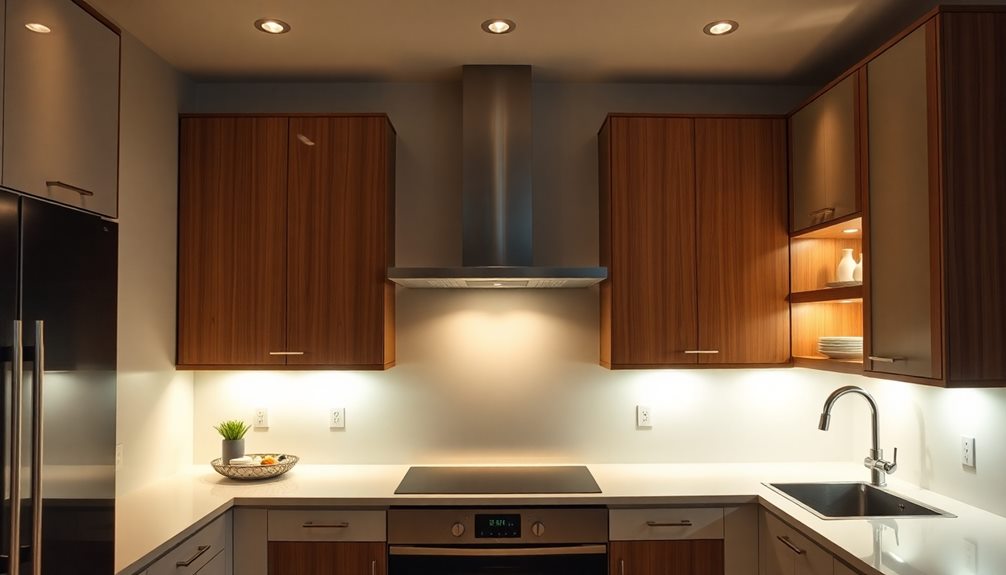When choosing warming products for your home, first assess your heating needs and the space size. You’ll find various systems like forced air, radiant heating, and efficient heat pumps. Consider energy efficiency ratings and fuel sources, such as natural gas or renewables, to lower costs and impact. Installation and maintenance are key factors too. By understanding these elements, you can make a smart choice that suits your lifestyle and budget. There’s more to explore about optimizing your heating options!
Key Takeaways
- Assess your space’s size and heating needs to choose an appropriately sized system for optimal performance and energy efficiency.
- Compare heating system types, such as forced air, radiant heating, and heat pumps, to find the best fit for your lifestyle and budget.
- Consider the fuel source options like natural gas, propane, and renewable energy, factoring in local prices and efficiency ratings.
- Prioritize regular maintenance and inspections to enhance your heating system’s longevity and efficiency, potentially saving on repair costs.
- Stay informed about future trends, such as smart technology and hybrid systems, to improve efficiency and reduce environmental impact.
Understanding Your Heating Needs
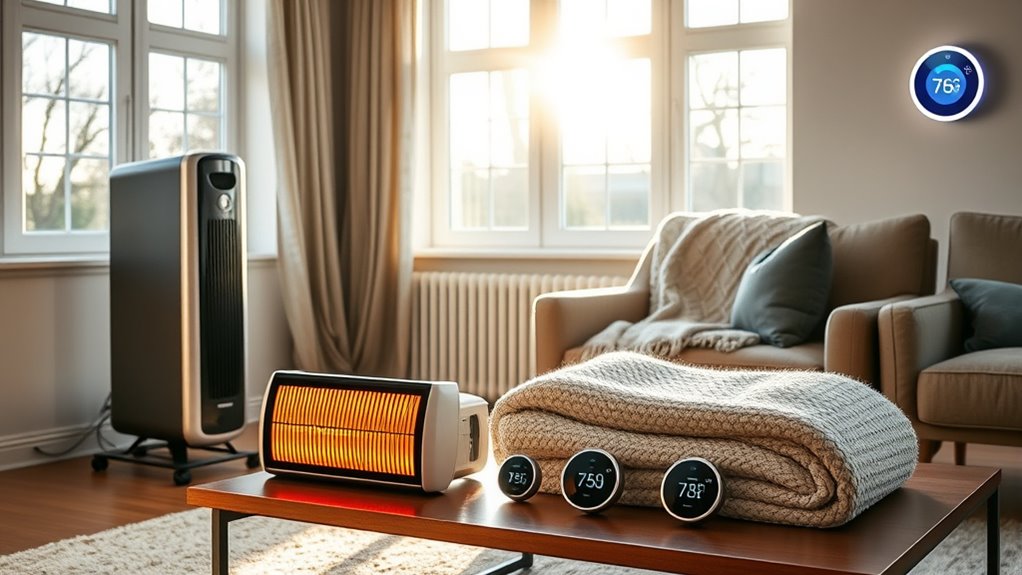
How do you know what heating system is right for your home? Start by evaluating the size and capacity of your space. An undersized heater can’t maintain the heat, while an oversized unit wastes energy.
Next, assess energy efficiency by looking at the Annual Fuel Utilization Efficiency (AFUE) ratings; higher ratings mean better performance and savings on utility bills. Additionally, consider the energy-efficient technology of commercial grade heat pumps, which are designed to operate effectively in larger spaces. These systems utilize the refrigeration cycle to transfer thermal energy efficiently. Heat pumps can achieve efficiencies of 300-600%, making them a superior choice for energy savings.
Assess energy efficiency through AFUE ratings; higher ratings indicate improved performance and reduced utility costs.
Consider the fuel sources available in your area—natural gas is popular, but electricity also offers options with varying costs.
Don’t forget to factor in installation and maintenance needs, as these can influence your initial investment and long-term performance.
Finally, think about features like smart thermostats for better temperature control, ensuring your home stays comfortable and efficient. Additionally, consider the benefits of energy-efficient heat pumps, which can provide significant long-term savings on energy bills.
Types of Heating Systems

- Forced air systems: These are the most common in North America, using a furnace to blow heated air through ducts.
- Radiant heating: This method provides even heat distribution through in-floor systems or radiators, though installation can be pricier.
- Heat pumps: Gaining popularity for their energy efficiency, heat pumps extract heat from the outside air or ground and can also cool your home. Additionally, considering options like smart technology integration can enhance the efficiency and convenience of your heating system.
Each of these types of heating systems has its pros and cons, so think about what fits your lifestyle and budget best.
Energy Efficiency Considerations
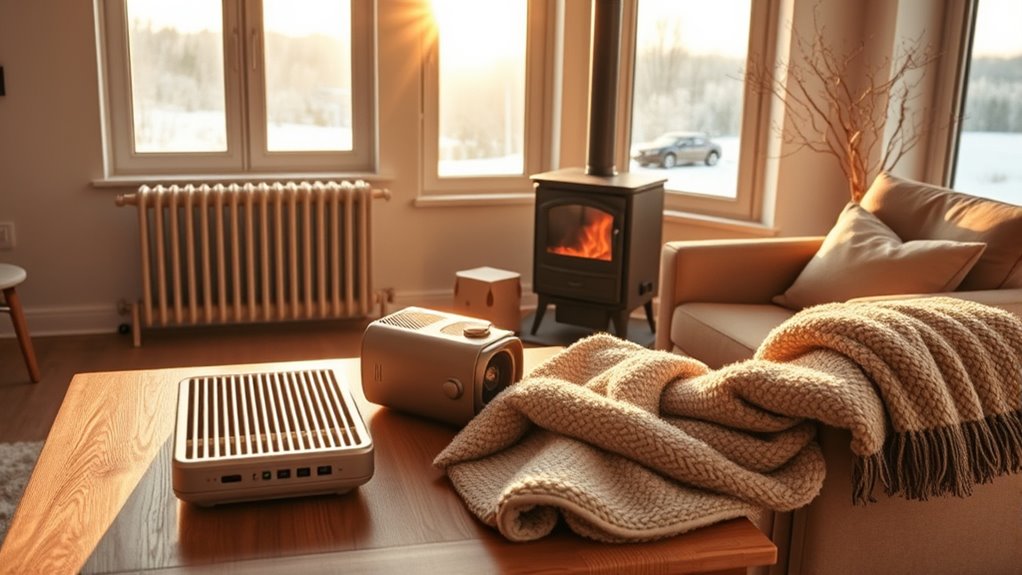
When choosing heating products, pay close attention to the Annual Fuel Utilization Efficiency (AFUE) ratings, as higher ratings mean better performance and lower energy costs.
You should also consider sustainable energy sources, which not only enhance efficiency but can also help reduce your carbon footprint. For example, geothermal heat pumps achieve efficiency ratings of 300% to 600%, significantly outperforming traditional HVAC systems. Additionally, heat pumps can reduce energy bills by up to 50%, making them a cost-effective choice for homeowners. The best heat pump systems incorporate advanced technology to ensure maximum efficiency and reliability. Regular maintenance and annual professional inspections can further enhance the longevity and efficiency of these systems.
Making informed choices in these areas can lead to significant savings and a more eco-friendly home. Additionally, exploring options like heat pumps can provide both heating and cooling capabilities while reducing energy consumption significantly.
AFUE Ratings Importance
Why settle for a heating system that isn’t efficient?
Choosing a heating system with a high AFUE rating can make a significant difference in your energy bills and overall comfort.
Here’s why you should pay attention to AFUE ratings:
- Higher AFUE means more fuel converted to usable heat.
- Systems with over 90% AFUE are considered high-efficiency models.
- Energy Star-certified heaters meet strict energy efficiency guidelines.
Sustainable Energy Sources
As you consider sustainable energy sources for your home heating, it’s essential to recognize how these options can greatly reduce your carbon footprint. Renewable energy sources like solar and geothermal markedly lower greenhouse gas emissions compared to traditional fossil fuel systems.
By focusing on heating system efficiency, you can maximize savings; look for high Annual Fuel Utilization Efficiency (AFUE) ratings to guarantee peak performance. Shifting to electric heat or heat pumps takes advantage of clean energy, especially in areas with renewable electricity generation.
Additionally, integrating smart home technology with energy-efficient heating systems allows you to control and enhance energy use, further improving sustainability and minimizing utility costs. Embracing these options not only benefits the environment but also your wallet.
Fuel Source Options
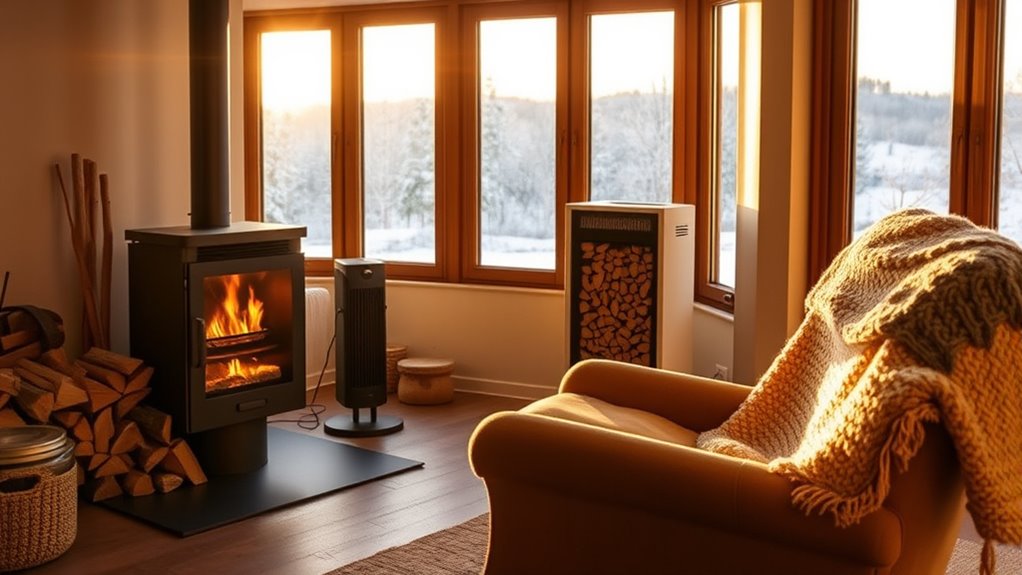
Choosing the right fuel source for your home heating system can feel overwhelming, but it’s essential for efficiency and cost-effectiveness. Consider these options:
- Natural gas: The most common choice, known for affordability and availability.
- Propane: A viable alternative in rural areas, though often pricier per BTU.
- Renewable energy: Solar and biofuels are gaining traction for reducing emissions.
When evaluating your options, compare local fuel prices and consider the Annual Fuel Utilization Efficiency (AFUE) ratings.
Natural gas typically offers the best efficiency, while propane might suit you if gas isn’t accessible.
Renewable sources are great for sustainability but may require an initial investment.
Make an informed decision that aligns with your heating needs and environmental goals.
Installation and Maintenance Requirements
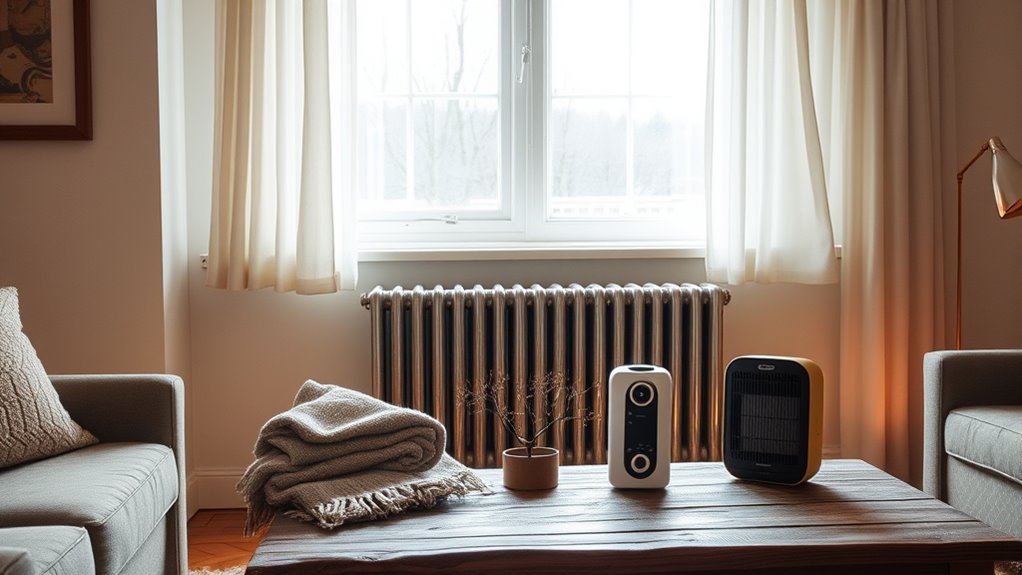
When selecting a heating system, understanding the installation and maintenance requirements is fundamental for ensuring long-term efficiency and performance.
The installation process varies by heater type; for instance, forced air systems fit into existing ductwork, while radiant heating often requires extensive floor modifications. It’s important to seek professional expertise for complex systems like boilers or heat pumps, as improper installation can lead to inefficiencies and costly maintenance down the line.
Regular maintenance is also essential; servicing furnaces and boilers annually helps catch potential issues early.
Finally, consider warranties and ease of maintenance when choosing your system, as some models offer more accessible components for routine upkeep, impacting both long-term costs and convenience.
Smart Heating Technology
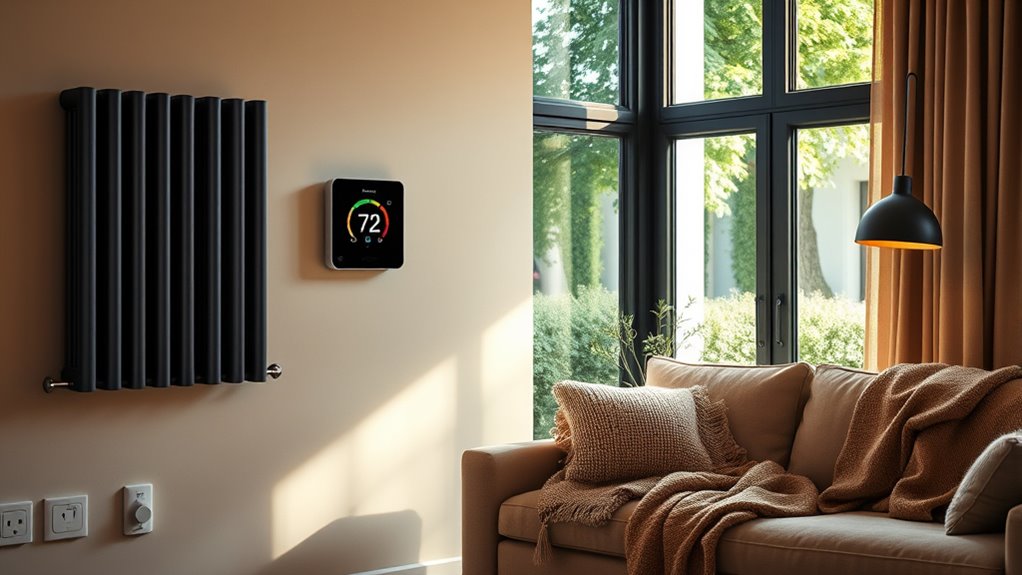
Smart heating technology can transform how you manage your home’s temperature.
With smart thermostats and energy management systems, you can optimize heating based on your habits, leading to significant savings on your bills.
Plus, integrating these solutions with your home automation makes temperature control effortless, whether you’re at home or away.
Smart Thermostats Benefits
While traditional thermostats require constant manual adjustments, smart thermostats offer a more efficient and user-friendly solution for managing your home’s heating.
With features designed for energy efficiency and convenience, these devices can remarkably enhance your experience.
- Reduce heating costs by 10-12% annually
- Adaptive learning technology optimizes temperature settings
- Remote access via smartphone apps for real-time control
Smart thermostats learn your habits, automatically adjusting heating systems based on whether you’re home or away.
With geofencing capabilities, they guarantee comfort and savings by modifying settings as you approach or leave your house.
Plus, they integrate seamlessly with other smart home devices, giving you complete control over your home’s energy usage.
Embrace the future of heating!
Energy Management Systems
Energy management systems revolutionize how you control your home’s heating.
With smart heating technology, you can monitor and adjust your heating settings remotely using smartphone apps, ensuring energy consumption is kept in check. Smart thermostats learn your habits and preferences, optimizing heating schedules to help you save up to 15% on energy bills annually.
You’ll appreciate the convenience of managing home temperatures through voice commands, thanks to compatibility with voice assistants.
Furthermore, advanced energy management systems analyze real-time energy usage data, pinpointing inefficiencies so you can make informed adjustments.
Integration With Home Automation
Integrating heating systems with home automation offers a seamless way to enhance comfort and efficiency in your home. By utilizing smart heating technology, you gain control over your heating preferences right from your smartphone or through voice commands.
Here are some benefits you’ll enjoy:
- Energy efficiency: Smart thermostats learn your habits, optimizing temperature settings and potentially saving you 10-15% on heating bills.
- Automated adjustments: Smart sensors detect occupancy, ensuring unoccupied rooms aren’t heated unnecessarily.
- Renewable energy integration: Some systems work with renewable energy sources, like solar panels, to boost savings and decrease your carbon footprint.
With features like scheduling and remote monitoring, home automation systems take your heating control to the next level, making your space both cozy and efficient.
Environmental Impact of Heating Systems
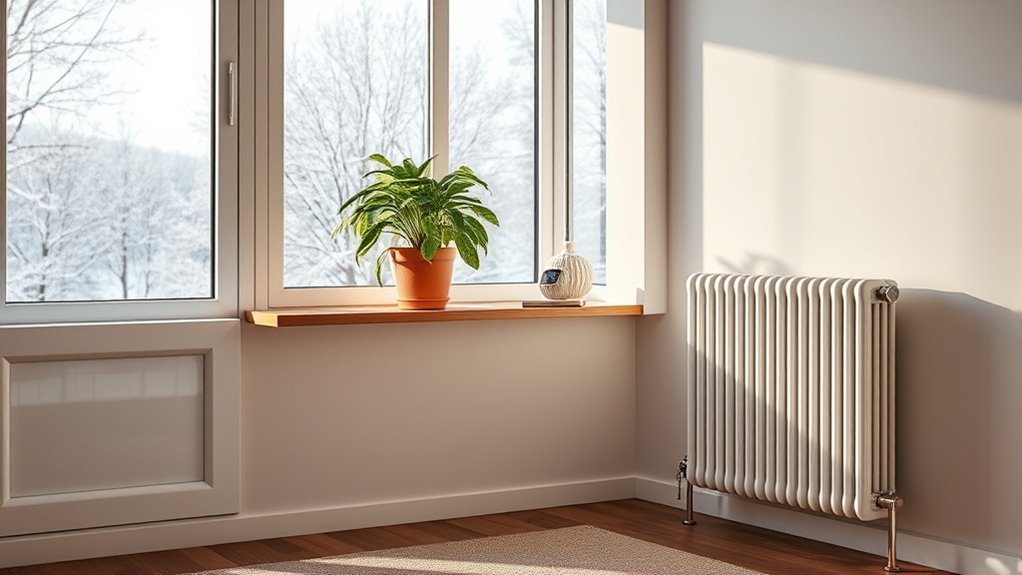
Heating systems play an essential role in your home’s overall environmental impact, especially when considering the type of fuel they use. Systems relying on fossil fuels like coal and natural gas contribute considerably to greenhouse gas emissions.
You should look for systems with a high Annual Fuel Utilization Efficiency (AFUE) rating, as these utilize fuel more efficiently, reducing emissions. Moving to renewable energy sources, such as solar or geothermal, can dramatically lower your carbon footprint.
While electric heating systems may be less efficient, they can also minimize environmental impact if powered by renewable energy.
Finally, the industry is evolving toward energy-efficient technologies and smart home systems, which optimize performance and further reduce your heating system’s environmental impact.
Cost Analysis and Budgeting

When you’re budgeting for heating systems, it’s crucial to evaluate initial installation expenses alongside long-term energy costs.
Don’t forget to factor in maintenance and repair fees, as these can add up over time.
A thorough cost analysis helps you make an informed choice that fits your financial situation.
Initial Installation Expenses
Installing a new heating system in your home can set you back anywhere from $450 to $48,000, depending on the type and complexity.
Here’s what you should consider regarding upfront investment and installation costs:
- Forced air furnaces can range from $5,000 to $10,000.
- Radiant floor heating may cost between $1,800 and $48,000.
- Electric resistance heaters are budget-friendly at $450 to $1,200.
While some heating systems require a larger upfront investment, they often come with improved energy efficiency, helping you save in the long run.
Heat pump systems typically average around $5,500, while hybrid systems could go up to $10,000.
Choosing wisely can make a significant difference in your overall heating expenses.
Long-Term Energy Costs
After considering the upfront costs of different heating systems, it’s important to look at how those choices will affect your long-term energy expenses. The AFUE rating is essential; higher efficiency means lower long-term energy costs. Energy-efficient heaters, especially those certified by Energy Star, can save you 10-50% on heating bills.
Here’s a quick comparison of fuel types and their potential savings:
| Fuel Type | Estimated Savings |
|---|---|
| Natural Gas | Most economical |
| Electricity | Moderate savings |
| Oil | Higher expenses |
| Heat Pumps | 30-40% savings |
Choosing the right fuel type and efficient heating systems can lead to significant savings over time, ultimately benefiting your budget.
Maintenance and Repair Fees
While budgeting for a heating system, it’s crucial to factor in maintenance and repair fees. Ignoring these costs can lead to unpleasant surprises down the line.
Consider these key points:
- Routine maintenance typically costs between $75 and $200 annually.
- Repair costs can range from $100 for minor issues to over $1,000 for major repairs.
- Setting aside about 1% of your heating system’s value for these expenses is a smart move.
Regular annual maintenance not only keeps your systems running smoothly but also enhances energy efficiency by 5-15%, potentially saving you $100 or more on heating bills.
Plus, don’t forget that warranty services can greatly lower repair costs, provided you keep up with maintenance.
Choosing Between Central and Distributed Heating
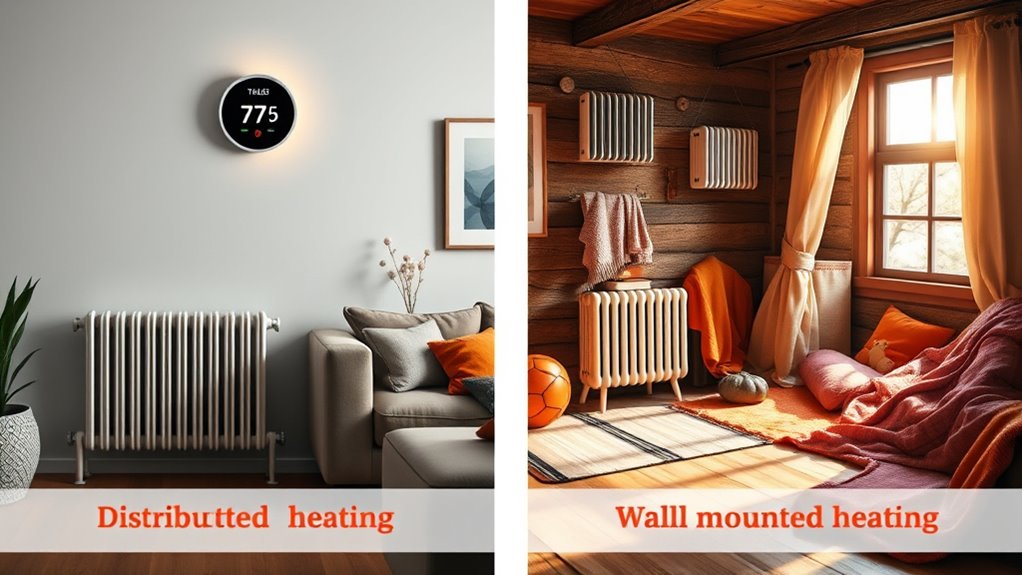
How do you decide between central and distributed heating for your home? It really comes down to your specific needs and preferences.
Central heating systems, like furnaces and boilers, heat your entire home efficiently, often boasting higher AFUE ratings. They’re great for larger spaces but come with higher upfront installation costs.
On the other hand, distributed heating systems, such as electric heaters or localized stoves, provide targeted warmth without the need for extensive ductwork. While they might be less energy-efficient overall, they allow you to control temperatures in specific areas.
Think about your budget and consider how much you’ll save on energy bills in the long run. Your choice will impact both comfort and efficiency in your home.
Future Trends in Home Heating

As homeowners increasingly prioritize energy efficiency and sustainability, the future of home heating is evolving rapidly.
Here are some key trends shaping this landscape:
Key trends are redefining home heating, focusing on efficiency, sustainability, and advanced technology integration.
- Heat pumps are gaining traction, offering efficient heating and cooling options.
- Smart home technology is making it easier for you to control your heating remotely.
- Renewable energy sources, like solar and geothermal, are becoming popular alternatives to fossil fuels.
You’ll likely see more electric systems, which reduce emissions while improving performance.
Innovations in hybrid systems that combine heat pumps with gas furnaces are also on the rise, adapting to various climates.
Frequently Asked Questions
How to Choose the Right Heating System for Your Home?
To choose the right heating system for your home, start by evaluating your heating needs.
Calculate the required BTUs to guarantee efficiency.
Check energy efficiency ratings like AFUE; higher ratings save you money long-term.
Consider the fuel types available to you, such as natural gas or electricity, and factor in installation complexity and maintenance.
Finally, look for modern features like smart thermostats that enhance comfort and can lead to energy savings.
What Is the Best Heating Option for a House?
When you’re looking for the best heating option for your house, consider factors like energy efficiency, installation costs, and your local climate.
Forced air systems offer quick warmth but can be pricey.
Radiant heating is energy-efficient and distributes heat evenly.
Heat pumps are versatile, but may need backup heating in colder areas.
If you want a blend of both, hybrid systems could be your best bet, despite their higher upfront costs.
What Is the Healthiest Way to Heat Your Home?
Imagine curling up in a cozy, dust-free haven.
The healthiest way to heat your home often involves radiant heating systems, which keep warmth consistent while cutting down allergens.
Electric infrared heaters are another great choice, directly warming objects instead of circulating dust.
If you’re eco-conscious, consider heat pumps or solar systems, which reduce emissions and improve indoor air quality.
Opting for these methods creates a comfortable, healthier living environment for you and your family.
What Is the Most Cost-Effective Way to Keep a House Warm?
To keep your house warm cost-effectively, consider using a programmable thermostat. It helps optimize heating when you’re away or asleep, cutting costs by 10-30%.
Invest in a heating system with a high AFUE rating—over 90% is ideal.
Don’t forget about insulation improvements; they can reduce heat loss and save you up to 20%.
Finally, if you live in a sunny area, solar heating systems may offer long-term savings despite higher initial costs.
Conclusion
In choosing the right warming products for your home, it’s crucial to balance comfort, efficiency, and cost. Did you know that a well-insulated home can reduce heating costs by up to 50%? Imagine that—half your energy bill disappearing! By understanding your heating needs and exploring various systems, you’ll not only keep your space cozy but also save money and reduce your environmental footprint. So, take the time to make an informed choice for a warmer, greener home.
